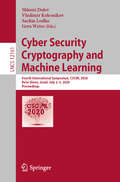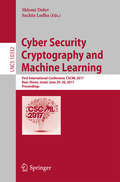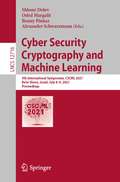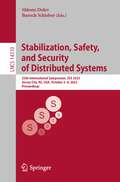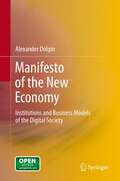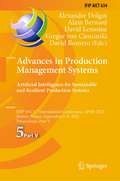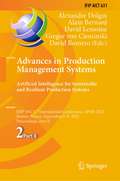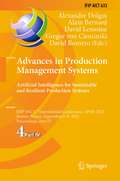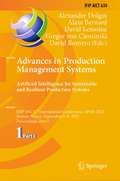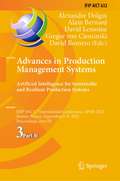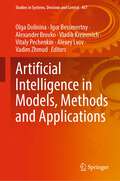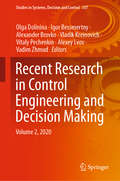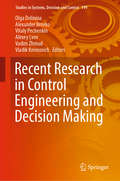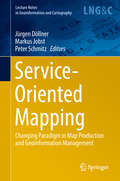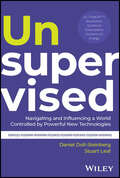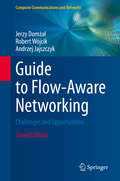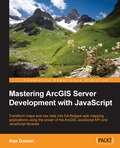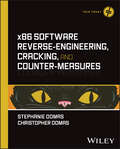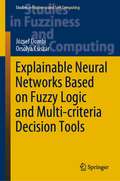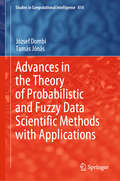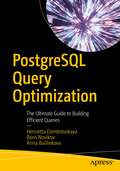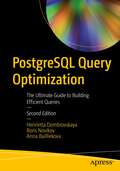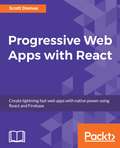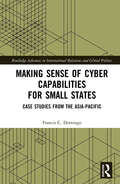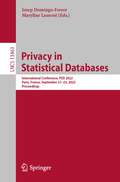- Table View
- List View
Cyber Security Cryptography and Machine Learning: Fourth International Symposium, CSCML 2020, Be'er Sheva, Israel, July 2–3, 2020, Proceedings (Lecture Notes in Computer Science #12161)
by Shlomi Dolev Vladimir Kolesnikov Sachin Lodha Gera WeissThis book constitutes the refereed proceedings of the Fourth International Symposium on Cyber Security Cryptography and Machine Learning, CSCML 2020, held in Beer-Sheva, Israel, in July 2020.The 12 full and 4 short papers presented in this volume were carefully reviewed and selected from 38 submissions. They deal with the theory, design, analysis, implementation, or application of cyber security, cryptography and machine learning systems and networks, and conceptually innovative topics in these research areas.
Cyber Security Cryptography and Machine Learning: First International Conference, CSCML 2017, Beer-Sheva, Israel, June 29-30, 2017, Proceedings (Lecture Notes in Computer Science #10332)
by Shlomi Dolev Sachin LodhaThis book constitutes the proceedings of the first International Symposium on Cyber Security Cryptography and Machine Learning, held in Beer-Sheva, Israel, in June 2017. The 17 full and 4 short papers presented include cyber security; secure software development methodologies, formal methods semantics and verification of secure systems; fault tolerance, reliability, availability of distributed secure systems; game-theoretic approaches to secure computing; automatic recovery of self-stabilizing and self-organizing systems; communication, authentication and identification security; cyber security for mobile and Internet of things; cyber security of corporations; security and privacy for cloud, edge and fog computing; cryptography; cryptographic implementation analysis and construction; secure multi-party computation; privacy-enhancing technologies and anonymity; post-quantum cryptography and security; machine learning and big data; anomaly detection and malware identification; business intelligence and security; digital forensics; digital rights management; trust management and reputation systems; information retrieval, risk analysis, DoS.
Cyber Security Cryptography and Machine Learning: 5th International Symposium, CSCML 2021, Be'er Sheva, Israel, July 8–9, 2021, Proceedings (Lecture Notes in Computer Science #12716)
by Shlomi Dolev Oded Margalit Benny Pinkas Alexander SchwarzmannThis book constitutes the refereed proceedings of the 5th International Symposium on Cyber Security Cryptography and Machine Learning, CSCML 2021, held in Be'er Sheva, Israel, in July 2021.The 22 full and 13 short papers presented together with a keynote paper in this volume were carefully reviewed and selected from 48 submissions. They deal with the theory, design, analysis, implementation, or application of cyber security, cryptography and machine learning systems and networks, and conceptually innovative topics in these research areas.
Stabilization, Safety, and Security of Distributed Systems: 25th International Symposium, SSS 2023, Jersey City, NJ, USA, October 2–4, 2023, Proceedings (Lecture Notes in Computer Science #14310)
by Shlomi Dolev Baruch SchieberThis book constitutes the proceedings of 25th International Symposium, SSS 2023, in Jersey City, NJ, USA, in October 2023.The 32 full papers presented together with 8 short papers were carefully reviewed and selected from 78 submissions. The conference was organized into five tracks reflecting major trends related to the conference: (i) Track A. Self-stabilizing Systems: Theory and Practice, (ii) Track B. Distributed and Concurrent Computing: Foundations, Fault-Tolerance and Scalability, (iii) Track C. Cryptogrophy and Security, (iv) Track D. Dynamic, Mobile and Nature-Inspired Computing Mobile Agents, (v) and Distributed Databases.
Manifesto of the New Economy: Institutions and Business Models of the Digital Society
by Alexander DolginThe book describes the main directions for the development of the digital society. The author angles its book to those who are interested to know what would replace search engines, and how social networks would evolve; what profit can be made of different forms of informational collaboration (crowdsourcing, collaborative filtering). And, the main thing, how it will influence the structure of the society and human pursuit for happiness. The author does not confine himself to a theory, he sets and solves practical questions: How talent, success and "stardom" are interconnected, how to make money in social networks, what is the business model for the development of entertainment and media, how to measure cultural values, and what is the subjective time of the individual and how to make it qualitative? There have been no answers to these questions before. Internet and social networks have provided tools and data that Alexander Dolgin was the first to use in economics.
Advances in Production Management Systems. Artificial Intelligence for Sustainable and Resilient Production Systems: IFIP WG 5.7 International Conference, APMS 2021, Nantes, France, September 5–9, 2021, Proceedings, Part V (IFIP Advances in Information and Communication Technology #634)
by Alexandre Dolgui Alain Bernard David Lemoine Gregor Von Cieminski David RomeroThe five-volume set IFIP AICT 630, 631, 632, 633, and 634 constitutes the refereed proceedings of the International IFIP WG 5.7 Conference on Advances in Production Management Systems, APMS 2021, held in Nantes, France, in September 2021.*The 378 papers presented were carefully reviewed and selected from 529 submissions. They discuss artificial intelligence techniques, decision aid and new and renewed paradigms for sustainable and resilient production systems at four-wall factory and value chain levels. The papers are organized in the following topical sections: Part I: artificial intelligence based optimization techniques for demand-driven manufacturing; hybrid approaches for production planning and scheduling; intelligent systems for manufacturing planning and control in the industry 4.0; learning and robust decision support systems for agile manufacturing environments; low-code and model-driven engineering for production system; meta-heuristics and optimization techniques for energy-oriented manufacturing systems; metaheuristics for production systems; modern analytics and new AI-based smart techniques for replenishment and production planning under uncertainty; system identification for manufacturing control applications; and the future of lean thinking and practice Part II: digital transformation of SME manufacturers: the crucial role of standard; digital transformations towards supply chain resiliency; engineering of smart-product-service-systems of the future; lean and Six Sigma in services healthcare; new trends and challenges in reconfigurable, flexible or agile production system; production management in food supply chains; and sustainability in production planning and lot-sizing Part III: autonomous robots in delivery logistics; digital transformation approaches in production management; finance-driven supply chain; gastronomic service system design; modern scheduling and applications in industry 4.0; recent advances in sustainable manufacturing; regular session: green production and circularity concepts; regular session: improvement models and methods for green and innovative systems; regular session: supply chain and routing management; regular session: robotics and human aspects; regular session: classification and data management methods; smart supply chain and production in society 5.0 era; and supply chain risk management under coronavirus Part IV: AI for resilience in global supply chain networks in the context of pandemic disruptions; blockchain in the operations and supply chain management; data-based services as key enablers for smart products, manufacturing and assembly; data-driven methods for supply chain optimization; digital twins based on systems engineering and semantic modeling; digital twins in companies first developments and future challenges; human-centered artificial intelligence in smart manufacturing for the operator 4.0; operations management in engineer-to-order manufacturing; product and asset life cycle management for smart and sustainable manufacturing systems; robotics technologies for control, smart manufacturing and logistics; serious games analytics: improving games and learning support; smart and sustainable production and supply chains; smart methods and techniques for sustainable supply chain management; the new digital lean manufacturing paradigm; and the role of emerging technologies in disaster relief operations: lessons from COVID-19 Part V: data-driven platforms and applications in production and logistics: digital twins and AI for sustainability; regular session: new approaches for routing problem solving; regular session: improvement of design and operation of manufacturing systems; regular session: crossdock and transportation issues; regular session: maintenance improvement and lifecycle management; regular session: additive manufacturing and mass customization; regular session: frameworks and conceptual modelling for systems and services efficiency; regular session: optimization of production and transportation
Advances in Production Management Systems. Artificial Intelligence for Sustainable and Resilient Production Systems: IFIP WG 5.7 International Conference, APMS 2021, Nantes, France, September 5–9, 2021, Proceedings, Part II (IFIP Advances in Information and Communication Technology #631)
by Alexandre Dolgui Alain Bernard David Lemoine Gregor Von Cieminski David RomeroThe five-volume set IFIP AICT 630, 631, 632, 633, and 634 constitutes the refereed proceedings of the International IFIP WG 5.7 Conference on Advances in Production Management Systems, APMS 2021, held in Nantes, France, in September 2021.*The 378 papers presented were carefully reviewed and selected from 529 submissions. They discuss artificial intelligence techniques, decision aid and new and renewed paradigms for sustainable and resilient production systems at four-wall factory and value chain levels. The papers are organized in the following topical sections: Part I: artificial intelligence based optimization techniques for demand-driven manufacturing; hybrid approaches for production planning and scheduling; intelligent systems for manufacturing planning and control in the industry 4.0; learning and robust decision support systems for agile manufacturing environments; low-code and model-driven engineering for production system; meta-heuristics and optimization techniques for energy-oriented manufacturing systems; metaheuristics for production systems; modern analytics and new AI-based smart techniques for replenishment and production planning under uncertainty; system identification for manufacturing control applications; and the future of lean thinking and practice Part II: digital transformation of SME manufacturers: the crucial role of standard; digital transformations towards supply chain resiliency; engineering of smart-product-service-systems of the future; lean and Six Sigma in services healthcare; new trends and challenges in reconfigurable, flexible or agile production system; production management in food supply chains; and sustainability in production planning and lot-sizing Part III: autonomous robots in delivery logistics; digital transformation approaches in production management; finance-driven supply chain; gastronomic service system design; modern scheduling and applications in industry 4.0; recent advances in sustainable manufacturing; regular session: green production and circularity concepts; regular session: improvement models and methods for green and innovative systems; regular session: supply chain and routing management; regular session: robotics and human aspects; regular session: classification and data management methods; smart supply chain and production in society 5.0 era; and supply chain risk management under coronavirus Part IV: AI for resilience in global supply chain networks in the context of pandemic disruptions; blockchain in the operations and supply chain management; data-based services as key enablers for smart products, manufacturing and assembly; data-driven methods for supply chain optimization; digital twins based on systems engineering and semantic modeling; digital twins in companies first developments and future challenges; human-centered artificial intelligence in smart manufacturing for the operator 4.0; operations management in engineer-to-order manufacturing; product and asset life cycle management for smart and sustainable manufacturing systems; robotics technologies for control, smart manufacturing and logistics; serious games analytics: improving games and learning support; smart and sustainable production and supply chains; smart methods and techniques for sustainable supply chain management; the new digital lean manufacturing paradigm; and the role of emerging technologies in disaster relief operations: lessons from COVID-19 Part V: data-driven platforms and applications in production and logistics: digital twins and AI for sustainability; regular session: new approaches for routing problem solving; regular session: improvement of design and operation of manufacturing systems; regular session: crossdock and transportation issues; regular session: maintenance improvement and lifecycle management; regular session: additive manufacturing and mass customization; regular session: frameworks and conceptual modelling for systems and services efficiency; regular session: optimization of production and transportation
Advances in Production Management Systems. Artificial Intelligence for Sustainable and Resilient Production Systems: IFIP WG 5.7 International Conference, APMS 2021, Nantes, France, September 5–9, 2021, Proceedings, Part IV (IFIP Advances in Information and Communication Technology #633)
by Alexandre Dolgui Alain Bernard David Lemoine Gregor Von Cieminski David RomeroThe five-volume set IFIP AICT 630, 631, 632, 633, and 634 constitutes the refereed proceedings of the International IFIP WG 5.7 Conference on Advances in Production Management Systems, APMS 2021, held in Nantes, France, in September 2021.*The 378 papers presented were carefully reviewed and selected from 529 submissions. They discuss artificial intelligence techniques, decision aid and new and renewed paradigms for sustainable and resilient production systems at four-wall factory and value chain levels. The papers are organized in the following topical sections: Part I: artificial intelligence based optimization techniques for demand-driven manufacturing; hybrid approaches for production planning and scheduling; intelligent systems for manufacturing planning and control in the industry 4.0; learning and robust decision support systems for agile manufacturing environments; low-code and model-driven engineering for production system; meta-heuristics and optimization techniques for energy-oriented manufacturing systems; metaheuristics for production systems; modern analytics and new AI-based smart techniques for replenishment and production planning under uncertainty; system identification for manufacturing control applications; and the future of lean thinking and practice Part II: digital transformation of SME manufacturers: the crucial role of standard; digital transformations towards supply chain resiliency; engineering of smart-product-service-systems of the future; lean and Six Sigma in services healthcare; new trends and challenges in reconfigurable, flexible or agile production system; production management in food supply chains; and sustainability in production planning and lot-sizing Part III: autonomous robots in delivery logistics; digital transformation approaches in production management; finance-driven supply chain; gastronomic service system design; modern scheduling and applications in industry 4.0; recent advances in sustainable manufacturing; regular session: green production and circularity concepts; regular session: improvement models and methods for green and innovative systems; regular session: supply chain and routing management; regular session: robotics and human aspects; regular session: classification and data management methods; smart supply chain and production in society 5.0 era; and supply chain risk management under coronavirus Part IV: AI for resilience in global supply chain networks in the context of pandemic disruptions; blockchain in the operations and supply chain management; data-based services as key enablers for smart products, manufacturing and assembly; data-driven methods for supply chain optimization; digital twins based on systems engineering and semantic modeling; digital twins in companies first developments and future challenges; human-centered artificial intelligence in smart manufacturing for the operator 4.0; operations management in engineer-to-order manufacturing; product and asset life cycle management for smart and sustainable manufacturing systems; robotics technologies for control, smart manufacturing and logistics; serious games analytics: improving games and learning support; smart and sustainable production and supply chains; smart methods and techniques for sustainable supply chain management; the new digital lean manufacturing paradigm; and the role of emerging technologies in disaster relief operations: lessons from COVID-19 Part V: data-driven platforms and applications in production and logistics: digital twins and AI for sustainability; regular session: new approaches for routing problem solving; regular session: improvement of design and operation of manufacturing systems; regular session: crossdock and transportation issues; regular session: maintenance improvement and lifecycle management; regular session: additive manufacturing and mass customization; regular session: frameworks and conceptual modelling for systems and services efficiency; regular session: optimization of production and transportation
Advances in Production Management Systems. Artificial Intelligence for Sustainable and Resilient Production Systems: IFIP WG 5.7 International Conference, APMS 2021, Nantes, France, September 5–9, 2021, Proceedings, Part I (IFIP Advances in Information and Communication Technology #630)
by Alexandre Dolgui Alain Bernard David Lemoine Gregor Von Cieminski David RomeroThe five-volume set IFIP AICT 630, 631, 632, 633, and 634 constitutes the refereed proceedings of the International IFIP WG 5.7 Conference on Advances in Production Management Systems, APMS 2021, held in Nantes, France, in September 2021.*The 378 papers presented were carefully reviewed and selected from 529 submissions. They discuss artificial intelligence techniques, decision aid and new and renewed paradigms for sustainable and resilient production systems at four-wall factory and value chain levels. The papers are organized in the following topical sections: Part I: artificial intelligence based optimization techniques for demand-driven manufacturing; hybrid approaches for production planning and scheduling; intelligent systems for manufacturing planning and control in the industry 4.0; learning and robust decision support systems for agile manufacturing environments; low-code and model-driven engineering for production system; meta-heuristics and optimization techniques for energy-oriented manufacturing systems; metaheuristics for production systems; modern analytics and new AI-based smart techniques for replenishment and production planning under uncertainty; system identification for manufacturing control applications; and the future of lean thinking and practice Part II: digital transformation of SME manufacturers: the crucial role of standard; digital transformations towards supply chain resiliency; engineering of smart-product-service-systems of the future; lean and Six Sigma in services healthcare; new trends and challenges in reconfigurable, flexible or agile production system; production management in food supply chains; and sustainability in production planning and lot-sizing Part III: autonomous robots in delivery logistics; digital transformation approaches in production management; finance-driven supply chain; gastronomic service system design; modern scheduling and applications in industry 4.0; recent advances in sustainable manufacturing; regular session: green production and circularity concepts; regular session: improvement models and methods for green and innovative systems; regular session: supply chain and routing management; regular session: robotics and human aspects; regular session: classification and data management methods; smart supply chain and production in society 5.0 era; and supply chain risk management under coronavirus Part IV: AI for resilience in global supply chain networks in the context of pandemic disruptions; blockchain in the operations and supply chain management; data-based services as key enablers for smart products, manufacturing and assembly; data-driven methods for supply chain optimization; digital twins based on systems engineering and semantic modeling; digital twins in companies first developments and future challenges; human-centered artificial intelligence in smart manufacturing for the operator 4.0; operations management in engineer-to-order manufacturing; product and asset life cycle management for smart and sustainable manufacturing systems; robotics technologies for control, smart manufacturing and logistics; serious games analytics: improving games and learning support; smart and sustainable production and supply chains; smart methods and techniques for sustainable supply chain management; the new digital lean manufacturing paradigm; and the role of emerging technologies in disaster relief operations: lessons from COVID-19 Part V: data-driven platforms and applications in production and logistics: digital twins and AI for sustainability; regular session: new approaches for routing problem solving; regular session: improvement of design and operation of manufacturing systems; regular session: crossdock and transportation issues; regular session: maintenance improvement and lifecycle management; regular session: additive manufacturing and mass customization; regular session: frameworks and conceptual modelling for systems and services efficiency; regular session: optimization of production and transportation
Advances in Production Management Systems. Artificial Intelligence for Sustainable and Resilient Production Systems: IFIP WG 5.7 International Conference, APMS 2021, Nantes, France, September 5–9, 2021, Proceedings, Part III (IFIP Advances in Information and Communication Technology #632)
by Alexandre Dolgui Alain Bernard David Lemoine Gregor Von Cieminski David RomeroThe five-volume set IFIP AICT 630, 631, 632, 633, and 634 constitutes the refereed proceedings of the International IFIP WG 5.7 Conference on Advances in Production Management Systems, APMS 2021, held in Nantes, France, in September 2021.*The 378 papers presented were carefully reviewed and selected from 529 submissions. They discuss artificial intelligence techniques, decision aid and new and renewed paradigms for sustainable and resilient production systems at four-wall factory and value chain levels. The papers are organized in the following topical sections: Part I: artificial intelligence based optimization techniques for demand-driven manufacturing; hybrid approaches for production planning and scheduling; intelligent systems for manufacturing planning and control in the industry 4.0; learning and robust decision support systems for agile manufacturing environments; low-code and model-driven engineering for production system; meta-heuristics and optimization techniques for energy-oriented manufacturing systems; metaheuristics for production systems; modern analytics and new AI-based smart techniques for replenishment and production planning under uncertainty; system identification for manufacturing control applications; and the future of lean thinking and practice Part II: digital transformation of SME manufacturers: the crucial role of standard; digital transformations towards supply chain resiliency; engineering of smart-product-service-systems of the future; lean and Six Sigma in services healthcare; new trends and challenges in reconfigurable, flexible or agile production system; production management in food supply chains; and sustainability in production planning and lot-sizing Part III: autonomous robots in delivery logistics; digital transformation approaches in production management; finance-driven supply chain; gastronomic service system design; modern scheduling and applications in industry 4.0; recent advances in sustainable manufacturing; regular session: green production and circularity concepts; regular session: improvement models and methods for green and innovative systems; regular session: supply chain and routing management; regular session: robotics and human aspects; regular session: classification and data management methods; smart supply chain and production in society 5.0 era; and supply chain risk management under coronavirus Part IV: AI for resilience in global supply chain networks in the context of pandemic disruptions; blockchain in the operations and supply chain management; data-based services as key enablers for smart products, manufacturing and assembly; data-driven methods for supply chain optimization; digital twins based on systems engineering and semantic modeling; digital twins in companies first developments and future challenges; human-centered artificial intelligence in smart manufacturing for the operator 4.0; operations management in engineer-to-order manufacturing; product and asset life cycle management for smart and sustainable manufacturing systems; robotics technologies for control, smart manufacturing and logistics; serious games analytics: improving games and learning support; smart and sustainable production and supply chains; smart methods and techniques for sustainable supply chain management; the new digital lean manufacturing paradigm; and the role of emerging technologies in disaster relief operations: lessons from COVID-19 Part V: data-driven platforms and applications in production and logistics: digital twins and AI for sustainability; regular session: new approaches for routing problem solving; regular session: improvement of design and operation of manufacturing systems; regular session: crossdock and transportation issues; regular session: maintenance improvement and lifecycle management; regular session: additive manufacturing and mass customization; regular session: frameworks and conceptual modelling for systems and services efficiency; regular session: optimization of production and transportation
Artificial Intelligence in Models, Methods and Applications (Studies in Systems, Decision and Control #457)
by Olga Dolinina Igor Bessmertny Alexander Brovko Vladik Kreinovich Vitaly Pechenkin Alexey Lvov Vadim ZhmudThis book is based on the accepted research papers presented in the International Conference "Artificial Intelligence in Engineering & Science" (AIES-2022). The aim of the AIES Conference is to bring together researchers involved in the theory of computational intelligence, knowledge engineering, fuzzy systems, soft computing, machine learning and related areas and applications in engineering, bioinformatics, industry, medicine, energy, smart city, social spheres and other areas. This book presents new perspective research results: models, methods, algorithms and applications in the field of Artificial Intelligence (AI). Particular emphasis is given to the medical applications - medical images recognition, development of the expert systems which could be interesting for the AI researchers as well for the physicians looking for the new ideas in medicine. The central audience of the book are researchers, industrial practitioners, students specialized in the Artificial Intelligence.
Recent Research in Control Engineering and Decision Making: Volume 2, 2020 (Studies in Systems, Decision and Control #337)
by Olga Dolinina Igor Bessmertny Alexander Brovko Vladik Kreinovich Vitaly Pechenkin Alexey Lvov Vadim ZhmudThis book constitutes the full research papers and short monographs developed on the base of the refereed proceedings of the International Conference: Information and Communication Technologies for Research and Industry (ICIT 2020). The book brings accepted research papers which present mathematical modelling, innovative approaches and methods of solving problems in the sphere of control engineering and decision making for the various fields of studies: industry and research, energy efficiency and sustainability, ontology-based data simulation, theory and use of digital signal processing, cognitive systems, robotics, cybernetics, automation control theory, image and sound processing, image recognition, technologies, and computer vision. The book contains also several analytical reviews on using smart city technologies in Russia. The central audience of the book are researchers, industrial practitioners and students from the following areas: Adaptive Systems, Human–Robot Interaction, Artificial Intelligence, Smart City and Internet of Things, Information Systems, Mathematical Modelling, and the Information Sciences.
Recent Research in Control Engineering and Decision Making (Studies in Systems, Decision and Control #199)
by Olga Dolinina Alexander Brovko Vitaly Pechenkin Alexey Lvov Vadim Zhmud Vladik KreinovichThis book constitutes the full papers and short monographs developed on the base of the refereed proceedings of the International Conference on Information Technologies: Information and Communication Technologies for Research and Industry (ICIT-2019), held in Saratov, Russia in February 2019.The book brings accepted papers which present new approaches and methods of solving problems in the sphere of control engineering and decision making for the various fields of studies: industry and research, ontology-based data simulation, smart city technologies, theory and use of digital signal processing, cognitive systems, robotics, cybernetics, automation control theory, image recognition technologies, and computer vision.Particular emphasis is laid on modern trends, new approaches, algorithms and methods in selected fields of interest.The presented papers were accepted after careful reviews made by at least three independent reviewers in a double-blind way. The acceptance level was about 60%. The chapters are organized thematically in several areas within the following tracks:• Models, Methods & Approaches in Decision Making Systems• Mathematical Modelling for Industry & Research• Smart City TechnologiesThe conference is focused on development and globalization of information and communication technologies (ICT), methods of control engineering and decision making along with innovations and networking, ICT for sustainable development and technological change, and global challenges. Moreover, the ICIT-2019 served as a discussion area for the actual above-mentioned topics.The editors believe that the readers will find the proceedings interesting and useful for their own research work.
Service-Oriented Mapping: Changing Paradigm in Map Production and Geoinformation Management (Lecture Notes in Geoinformation and Cartography)
by Jürgen Döllner Markus Jobst Peter SchmitzThis book gathers various perspectives on modern map production. Its primary focus is on the new paradigm of “sharing and reuse,” which is based on decentralized, service-oriented access to spatial data sources. Service-Oriented Mapping is one of the main paradigms used to embed big data and distributed sources in modern map production, without the need to own the sources. To be stable and reliable, this architecture requires specific frameworks, tools and procedures. In addition to the technological structures, organizational aspects and geographic information system (GIS) capabilities provide powerful tools to make modern geoinformation management successful. Addressing a range of aspects, including the implementation of the semantic web in geoinformatics, using big data for geospatial visualization, standardization initiatives, and the European spatial data infrastructure, the book offers a comprehensive introduction to decentralized map production..
Unsupervised: Navigating and Influencing a World Controlled by Powerful New Technologies
by Daniel Doll-Steinberg Stuart LeafHow a broad range of new immensely powerful technologies is disrupting and transforming every corner of our reality—and why you must act and adapt Unsupervised: Navigating and Influencing a World Controlled by Powerful New Technologies examines the fast-emerging technologies and tools that are already starting to completely revolutionize our world. Beyond that, the book takes an in-depth look at how we have arrived at this dizzying point in our history, who holds the reins of these formidable technologies, mostly without any supervision. It explains why we as business leaders, entrepreneurs, academics, educators, lawmakers, investors or users and all responsible citizens must act now to influence and help oversee the future of a technological world. Quantum computing, artificial intelligence, blockchain, decentralization, virtual and augmented reality, and permanent connectivity are just a few of the technologies and trends considered, but the book delves much deeper, too. You’ll find a thorough analysis of energy and medical technologies, as well as cogent predictions for how new tech will redefine your work, your money, your entertainment, your transportation and your home and cities, and what you need to know to harness and prosper from these technologies. Authors Daniel Doll-Steinberg and Stuart Leaf draw on their decades of building and implementing disruptive technologies, investing and deploying funds, and advising business leaders, governments and supranational bodies on change management, the future of work, innovation and disruption, education and the economy to consider how every area of our lives, society, economy and government will likely witness incredible changes in the coming decade. When we look just a bit further into the future, we can see that the task facing us is to completely reinvent life as we know it—work, resources, war, and even humanity itself will undergo redefinition, thanks to these new and emerging tools. In Unsupervised, you’ll consider what these redefinitions might look like, and how we as individuals, and part of society, can prevent powerful new technologies from falling into the wrong hands or be built to harm us. Get a primer on the foundational technologies that are reshaping business, pleasure, and life as we know it Learn about the lesser known, yet astonishing, technologies set to revolutionize medicine, agriculture, and beyond Consider the potential impact of new tech across business sectors—and what it means for you Gain the knowledge and inspiration you need to harness your own power and push the future in the direction of good for all of us not just the few Explore the best ways to invest in the changes these technologies of the future will bring about This is a remarkably thorough and comprehensive look at the future of technology and everything it touches. Shining a light on many unsupervised technologies and their unsupervised oligarchy of masters.
Guide to Flow-Aware Networking: Challenges and Opportunities (Computer Communications and Networks #0)
by Jerzy Domżał Robert Wójcik Andrzej JajszczykThe book presents a comprehensive view on Flow-Aware Networking. It starts with a brief overview of the known QoS architectures based on the concept of a flow. Then, the original FAN concept is presented, along with its variations proposed by the authors. The next chapter covers a very valuable feature of the FAN architecture, namely its ability to assure net neutrality. The chapters that follow will discuss, in detail, a variety of issues making the FAN concept implementable, including congestion control, fairness, resilience to failures, service differentiation and degradation. The final chapter presents the test implementation of the FAN router, including the environment used and performance tests. Chapters are supplemented with problems to solve, along with their solutions. The pedagogical character of the book is supported by a number of illustrative examples contained in most of the chapters. At the end of the book, a glossary of the key terms is included, along with a comprehensive bibliography.Flow-based traffic management is currently becoming a mainstream. There is plenty of Quality of Service (QoS) techniques based on flows. Software-Defined Networking with its dominant protocol OpenFlow also follows this trend. Flow-Aware Networking (FAN) is a promising QoS architecture. Information on FAN can be found in various research papers. It is, therefore highly scattered. This book gathers practically all relevant information regarding FAN and puts it together.Quality of Service assurance is one of the key challenges of today’s Internet. The existing approaches to provide QoS do not meet expectations of network operators, managers and users although numerous efforts in this area have been reported. One of the most promising concepts is the Flow-Aware Network (FAN). FAN can play a key role in assuring the net neutrality, smoothly combining interests of all the involved parties. The authors of the proposal have been involved in FAN research practically since its inception at the start of the 21st century. The book reports the wide experiences the authors accumulated in the subject area during the work on common FAN-related projects conducted with the team of James Roberts that proposed the original FAN concept as well as other leading research groups in Europe and the USA. One of the aims of the book is to accompany courses taught by the authors.
Mastering ArcGIS Server Development with JavaScript
by Ken DomanTransform maps and raw data into full-fledged web mapping applications using the power of the ArcGIS JavaScript API and JavaScript libraries About This Book * Create and share modern map applications for desktops, tablets, and mobile browsers * Present and edit geographic and related data through maps, charts, graphs, and more * Learn the tools, tips, and tricks made available through the API and related libraries with examples of real-world applications Who This Book Is For This book is intended for intermediate developers who want to design web mapping applications. You should have some experience with geographic information systems, especially with ArcGIS products such as ArcGIS Server. It also helps to have some experience with HTML, CSS, and JavaScript. What You Will Learn * Create single-page mapping applications, lining up data from different sources * Search for and display geographic and tabular information based on locations and attributes * Customize maps and widgets to deliver the best user experience * Present location data intuitively using charts and graphs * Integrate mapping applications with your favorite JavaScript frameworks * Test the working of your web map application and take advantage of cloud services such as ArcGIS Online * Create modern-looking web maps through styling tips and tricks In Detail ESRI and its ArcGIS line of software have been an industry leader in digital map production and publication for over 30 years. ArcGIS Server lets you design, configure, and publish maps that can be viewed and edited through the Internet. After designing basic maps, you may want to find out new and innovative ways to represent information using these maps. In this book, you'll work through practical examples, experiencing the pitfalls and successes of creating desktop and mobile map applications for a web browser using the ArcGIS Server platform. The book begins by introducing you to ArcGIS Server and ESRI's JavaScript API. You'll work with your first web map and then move on to learn about ESRI's building blocks. A Dojo AMS style widget will help you create your own widgets for a map and then see how to collect geographic data. Furthermore, you will learn different techniques such as using Dojo Charts to create charts and graphs to represent your data. Then you will see how to use ESRI JavaScript API with other JavaScript libraries and different styling methods to make your map stand out. By the end of the book, you will discover how to make your application compatible with different devices and platforms and test it using testing libraries. Style and approach An in-depth guide that explores web application development using ArcGIS Server and the ArcGIS JavaScript API. Topics are explained in the context of developing two applications for fictional clients. Details of application development, including possible pitfalls and best practices, are included in this book.
x86 Software Reverse-Engineering, Cracking, and Counter-Measures (Tech Today)
by Stephanie Domas Christopher DomasA crystal-clear and practical blueprint to software disassembly x86 Software Reverse-Engineering, Cracking, and Counter-Measures is centered around the world of disassembling software. It will start with the basics of the x86 assembly language, and progress to how that knowledge empowers you to reverse-engineer and circumvent software protections. No knowledge of assembly, reverse engineering, or software cracking is required. The book begins with a bootcamp on x86, learning how to read, write, and build in the assembly that powers a massive amount of the world’s computers. Then the book will shift to reverse engineering applications using a handful of industry favorites such as IDA, Ghidra, Olly, and more. Next, we move to cracking with techniques such as patching and key generation, all harnessing the power of assembly and reverse engineering. Lastly, we’ll examine cracking from a defensive perspective. Providing learners with techniques to be a better defender of their own software, or knowledge to crack these techniques more effectively. Assembly: computer Architecture, x86, system calls, building and linking, ASCII, condition codes, GDB, control flow, stack, calling conventions Reverse Engineering: reconnaissance, strings, RE strategy, stripping, linking, optimizations, compilers, industry tools Cracking: patching, key checkers, key generators, resource hacking, dependency walking Defense: anti-debugging, anti-tamper, packing, cryptors/decryptors, whitelist, blacklist, RASP, code signing, obfuscationA practical and hands-on resource for security professionals to hobbyists, this book is for anyone who wants to learn to take apart, understand, and modify black-box software. x86 Software Reverse-Engineering, Cracking, and Counter-Measures is a vital resource for security researchers, reverse engineers and defenders who analyze, research, crack or defend software applications.
Explainable Neural Networks Based on Fuzzy Logic and Multi-criteria Decision Tools (Studies in Fuzziness and Soft Computing #408)
by József Dombi Orsolya CsiszárThe research presented in this book shows how combining deep neural networks with a special class of fuzzy logical rules and multi-criteria decision tools can make deep neural networks more interpretable – and even, in many cases, more efficient. Fuzzy logic together with multi-criteria decision-making tools provides very powerful tools for modeling human thinking. Based on their common theoretical basis, we propose a consistent framework for modeling human thinking by using the tools of all three fields: fuzzy logic, multi-criteria decision-making, and deep learning to help reduce the black-box nature of neural models; a challenge that is of vital importance to the whole research community.
Advances in the Theory of Probabilistic and Fuzzy Data Scientific Methods with Applications (Studies in Computational Intelligence #814)
by József Dombi Tamás JónásThis book focuses on the advanced soft computational and probabilistic methods that the authors have published over the past few years. It describes theoretical results and applications, and discusses how various uncertainty measures – probability, plausibility and belief measures – can be treated in a unified way. It also examines approximations of four notable probability distributions (Weibull, exponential, logistic and normal) using a unified probability distribution function, and presents a fuzzy arithmetic-based time series model that provides an easy-to-use forecasting technique. Lastly, it proposes flexible fuzzy numbers for Likert scale-based evaluations. Featuring methods that can be successfully applied in a variety of areas, including engineering, economics, biology and the medical sciences, the book offers useful guidelines for practitioners and researchers.
PostgreSQL Query Optimization: The Ultimate Guide to Building Efficient Queries
by Henrietta Dombrovskaya Boris Novikov Anna BailliekovaWrite optimized queries. This book helps you write queries that perform fast and deliver results on time. You will learn that query optimization is not a dark art practiced by a small, secretive cabal of sorcerers. Any motivated professional can learn to write efficient queries from the get-go and capably optimize existing queries. You will learn to look at the process of writing a query from the database engine’s point of view, and know how to think like the database optimizer. The book begins with a discussion of what a performant system is and progresses to measuring performance and setting performance goals. It introduces different classes of queries and optimization techniques suitable to each, such as the use of indexes and specific join algorithms. You will learn to read and understand query execution plans along with techniques for influencing those plans for better performance. The book also covers advanced topics such as the use of functions and procedures, dynamic SQL, and generated queries. All of these techniques are then used together to produce performant applications, avoiding the pitfalls of object-relational mappers. What You Will LearnIdentify optimization goals in OLTP and OLAP systemsRead and understand PostgreSQL execution plansDistinguish between short queries and long queriesChoose the right optimization technique for each query typeIdentify indexes that will improve query performanceOptimize full table scansAvoid the pitfalls of object-relational mapping systemsOptimize the entire application rather than just database queries Who This Book Is ForIT professionals working in PostgreSQL who want to develop performant and scalable applications, anyone whose job title contains the words “database developer” or “database administrator" or who is a backend developer charged with programming database calls, and system architects involved in the overall design of application systems running against a PostgreSQL database
PostgreSQL Query Optimization: The Ultimate Guide to Building Efficient Queries
by Henrietta Dombrovskaya Boris Novikov Anna BailliekovaWrite optimized queries. This book helps you write queries that perform fast and deliver results on time. You will learn that query optimization is not a dark art practiced by a small, secretive cabal of sorcerers. Any motivated professional can learn to write efficient queries from the get-go and capably optimize existing queries. You will learn to look at the process of writing a query from the database engine’s point of view, and know how to think like the database optimizer. The book begins with a discussion of what a performant system is and progresses to measuring performance and setting performance goals. It introduces different classes of queries and optimization techniques suitable to each, such as the use of indexes and specific join algorithms. You will learn to read and understand query execution plans along with techniques for influencing those plans for better performance. The book also covers advanced topics such as the use of functions and procedures, dynamic SQL, and generated queries. All of these techniques are then used together to produce performant applications, avoiding the pitfalls of object-relational mappers.This second edition includes new examples using Postgres 15 and the newest version of the PostgresAir database. It includes additional details and clarifications about advanced topics, and covers configuration parameters in greater depth. Finally, it makes use of advancements in NORM, using automatically generated functions. What You Will LearnIdentify optimization goals in OLTP and OLAP systemsRead and understand PostgreSQL execution plansDistinguish between short queries and long queriesChoose the right optimization technique for each query typeIdentify indexes that will improve query performanceOptimize full table scansAvoid the pitfalls of object-relational mapping systemsOptimize the entire application rather than just database queries Who This Book Is ForIT professionals working in PostgreSQL who want to develop performant and scalable applications, anyone whose job title contains the words “database developer” or “database administrator" or who is a backend developer charged with programming database calls, and system architects involved in the overall design of application systems running against a PostgreSQL database
Progressive Web Apps with React: Create lightning fast web apps with native power using React and Firebase
by Scott DomesEnhance the performance of your applications by using React and adding the Progressive web app capability to itAbout This BookBring the best of mobile sites and native apps to your users with progressive web applicationsCreate fast, reliable, and engaging PWAs with React and FirebaseCreate high-performance applications even with low connection speeds by leveraging modern web technologiesWho This Book Is ForThis book is for Javascript Developers who want to develop high performance Web User Interfaces. This book requires basic knowledge of HTML, CSS and JavaScript.What You Will LearnSet up Webpack configuration, as well as get the development server runningLearn basic Firebase configuration and deploymentCreate routes, manage multiple components, and learn how to use React Router v4 to manage the flow of dataUse React life cycle methods to load dataAdd a service worker to the app and learn how it worksUse a service worker to send Push NotificationsConfigure Webpack to split up the JavaScript bundle and lazy load component filesLearn how to use the web Cache API to use your app offlineAudit PWAs with Google's Lighthouse toolIn DetailFor years, the speed and power of web apps has lagged behind native applications. Progressive Web Apps (PWAs) aim to solve this by bridging the gap between the web apps and native apps, delivering a host of exciting features. Simultaneously, React is fast becoming the go-to solution for building modern web UIs, combining ease of development with performance and capability. Using React alongside PWA technology will make it easy for you to build a fast, beautiful, and functional web app.After an introduction and brief overview of the goals of PWAs, the book moves on to setting up the application structure. From there, it covers the Webpack build process and the process of creating React components. You'll learn how to set up the backend database and authentication solution to communicate with Firebase and how to work with React Router. Next, you will create and configure your web app manifest, making your PWA installable on mobile devices. Then you'll get introduced to service workers and see how they work as we configure the app to send push notifications using Firebase Cloud Messaging. We'll also explore the App Shell pattern, a key concept in PWAs and look at its advantages regarding efficient performance. Finally, you'll learn how to add offline capabilities to the app with caching and confirm your progress by auditing your PWA with Lighthouse. Also, you'll discover helper libraries and shortcuts that will help you save time and understand the future of PWA development.Style and approachThis is a step-by-step book, wherein, you will use the React framework to create a complete progressive web app.
Making Sense of Cyber Capabilities for Small States: Case Studies from the Asia-Pacific (Routledge Advances in International Relations and Global Politics)
by Francis C. DomingoDomingo explores the potential of cyber capabilities for small states in the Asia-Pacific, the most active region for cyber conflict. He develops a systematic explanation for why Brunei, New Zealand, and Singapore have developed or are developing cyber capabilities. Studies on cyber conflict and strategy have substantially increased in the past decade but most have focused on the cyber operations of powerful states. This book moves away from the prominence of powerful states and explores the potential of cyber capabilities for small states in the Asia-Pacific, the most active region for cyber conflict. It develops a systematic explanation of why Brunei, New Zealand, and Singapore have developed or are developing cyber capabilities despite its obscure strategic value. The book argues that the distribution of power in the region and a "technology-oriented" strategic culture are two necessary conditions that influence the development of cyber capabilities in small states. Following this argument, the book draws on neoclassical realism as a theoretical framework to account for the interaction between these two conditions. The book also pursues three secondary objectives. First, it aims to determine the constraints and incentives that affect the utilization of cyber capabilities as foreign policy instruments. Second, the book evaluates the functionality of these cyber capabilities for small states. Lastly, it assesses the implications of employing cyber capabilities as foreign policy tools of small states. This book will be an invaluable resource for academics and security analysts working on cyber conflict, military strategy, small states, and International Relations in general.
Privacy in Statistical Databases: International Conference, PSD 2022, Paris, France, September 21–23, 2022, Proceedings (Lecture Notes in Computer Science #13463)
by Josep Domingo-Ferrer Maryline LaurentThis book constitutes the refereed proceedings of the International Conference on Privacy in Statistical Databases, PSD 2022, held in Paris, France, during September 21-23, 2022.The 25 papers presented in this volume were carefully reviewed and selected from 45 submissions. They were organized in topical sections as follows: Privacy models; tabular data; disclosure risk assessment and record linkage; privacy-preserving protocols; unstructured and mobility data; synthetic data; machine learning and privacy; and case studies.
